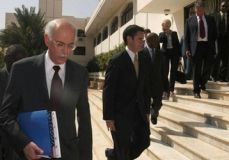UK, US envoys employ quiet diplomacy in Khartoum
Oct 16, 2006 (KHARTOUM) — After being accused of employing counterproductive “megaphone diplomacy”, Britain and the United States have both sent envoys to Sudan’s violent Darfur region on somewhat quieter diplomatic missions.
 The U.S. special envoy for Sudan, Andrew Natsios, arrived on Friday for a week-long visit, but his meetings have been closed to all media as he tries to avert a confrontation with Khartoum over U.N. troops in Darfur.
The U.S. special envoy for Sudan, Andrew Natsios, arrived on Friday for a week-long visit, but his meetings have been closed to all media as he tries to avert a confrontation with Khartoum over U.N. troops in Darfur.
The British minister for international development, Hilary Benn, arrived in Sudan on Monday also for a day of low-key negotiations.
The new approach follows weeks of rising tension between Khartoum and the West over a U.S.-British backed U.N. Security Council resolution that calls for the dispatch of 22,500 U.N. troops and police to Darfur to protect millions of people who fled fighting for shelter in squalid refugee camps.
Khartoum has called the U.N. troop plan an attempt to recolonise Sudan and has flatly rejected any plan to transfer the struggling African Union mission in Darfur to U.N. control.
Comments by U.S. officials on deploying a U.N. force without Khartoum’s consent have infuriated the Sudanese government.
Last month, outgoing U.N. Deputy Secretary-General Mark Malloch Brown accused the two Western allies of “posturing and grandstanding” and said their “megaphone diplomacy” was encouraging Khartoum’s defiance of a U.N. takeover of the struggling African Union mission in Darfur.
In the meantime, while diplomats spar over who will protect Darfuris, the violence in western Sudan has continued largely unabated.
Analysts say fighting has increased since an AU-mediated peace agreement, backed by the United States, was signed with much fanfare by one rebel faction and the government in May.
“Natsios is hoping to get more done by having a quiet mission,” said one Western diplomat in Khartoum.
SANCTIONS CLOUD
Dozens of delegations pass through Khartoum and Darfur each year, mostly hoping to bring attention to the Darfur crisis, called genocide by Washington and home to the world’s largest humanitarian operation.
Natsios’ visit has been clouded by U.S. President George W. Bush signing a law on Friday imposing sanctions on those Washington deems responsible for war crimes in Darfur.
“Ironically the American envoy is currently in Khartoum discussing improvement of bilateral relations,” said state-owned paper Sudan Vision.
“How can that be achieved while the American administration (continues) to talk tough to Sudan and for no good reason?”
But despite the hard feelings, Natsios has been welcomed by Khartoum rather than snubbed as was U.S. Assistant Secretary of State for African Affairs Jendayi Frazer during a recent trip.
“We want to move relations with Washington from confrontation to dialogue,” Sudan’s state press quoted Vice President Ali Osman Mohamed Taha as saying after meeting with Natsios.
And official restrictions limiting visiting U.S. officials to a few dozen kilometres outside Khartoum have been waived for Natsios. The policy was imposed in response to similar restrictions on Sudanese officials visiting the United States.
Mostly non-Arab rebels took up arms in early 2003 accusing the central government of neglect. Khartoum responded by arming mostly Arab militias to quell the revolt. Those militia stand accused of rape, pillage and murder.
The International Criminal Court is investigating alleged war crimes in Darfur. Observers say Khartoum fears U.N. troops would be used to arrest any officials likely to be indicted.
(Reuters)
